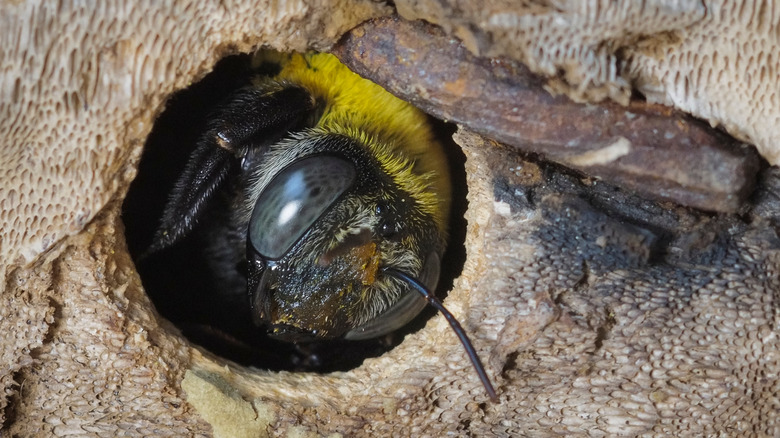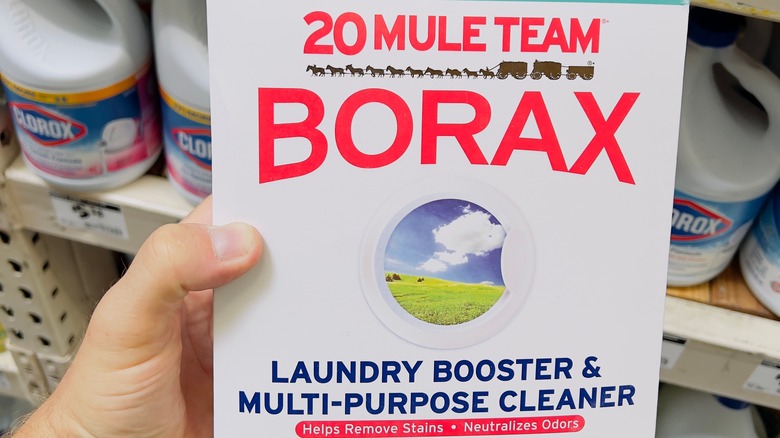Why You'll Want To Have Borax On Hand If You Have A Carpenter Bee Problem
While bees play a crucial role in our environment, particularly in pollination, there are instances where they become problematic, especially when dealing with a species that can damage wooden structures like carpenter bees. Suppose professional help is not an option, and it's just between you and the bees. In that case, there is a surprising solution that homeowners are turning to — sodium carbonate, better known as borax. That's right, although commonly used for cleaning, borax can also be used as an effective insecticide.
You might ask, why use borax when I can use the tried and true chemical agents made to kill bees? Well, for starters, borax is a natural insecticide: derived from a mineral, borax has properties that, when ingested by insects, disrupt their digestive and nervous systems, leading to their demise. Consider this situation: You discover small holes in the wooden sections of your home or garden structures. This could be the work of carpenter bees, which bore tunnels into the wood to make their nests. Using a borax solution on the affected wood can help repel and even get rid of these pests in no longer than a few days' time.
But before you try anything, let's break down how to effectively use borax against your bees while taking the necessary safety precautions. First, you want to assemble your materials and prepare a bait, which is just some borax, a sugary substance like honey, sugar, fruit syrup, and a bowl to mix them in.
How to use borax against carpenter bees while taking precaution
To begin the mixture, pour into the bowl a ratio of half borax and half sugary substance. Once prepared, place the bait mixture near the areas where you suspect carpenter bee activity. If outdoors, shield it from rain or watering to maintain its effectiveness and ensure that the borax is not easily accessible to pets or children. Though natural, borax is not entirely benign. Ingesting it in significant amounts can be toxic. Also, if using borax on bees in your backyard, keep it out of contact with plants in high concentrations, as it can adversely affect them.
Then, all that is left is regularly monitoring and replenishing the bait; this should lead to a noticeable reduction in bee activity over time as the mixture gets on their legs and bodies and is brought back to their hive. This, of course, spreads amongst the bees as they are social insects and eventually kills all of them. Please use it with caution, as borax can also kill other living things when ingested.
In addition to the bait, borax powder can be directly applied to the tunnels carpenter bees have created. Be careful; they may be deep in there, but they fly out fast, and you must take precautions by wearing protective clothing and avoiding application during peak activity times. Once you're confident the bees are no longer active, seal their holes using wooden dowels, wood filler, or caulk to prevent future infestations.
Benefits of using borax and important considerations
Borax's affordability makes it an attractive choice for many, especially compared to the often high costs associated with professional pest control services or commercial insecticides. Beyond its insecticidal properties, borax's versatility around the household — from cleaning tasks to its role as a laundry booster — reinforces its utility.
It's also relatively easy to use and considered more eco-friendly than most traditional methods, such as chemical insecticides that linger in the environment. However, while borax may be commonly thought of as an environmentally friendly alternative, it is important to recognize that many environmental groups criticize its sourcing process through mining — a practice that is far from eco-friendly. The mining process often involves pollution, deforestation, and the use of fossil fuels, which ultimately contradicts the notion of being environmentally conscious.
When using this trick, it's paramount to differentiate between the various bee species. While carpenter bees might be nuisances due to the damage they inflict on wooden structures, other bees, such as honeybees, are essential for our ecosystems, and professionals may be best for relocating the nest. Thus, while borax can be an effective solution against certain pests, ensuring the targeted use of borax is crucial. Proper application and safety precautions provide the best results as with any remedy.


